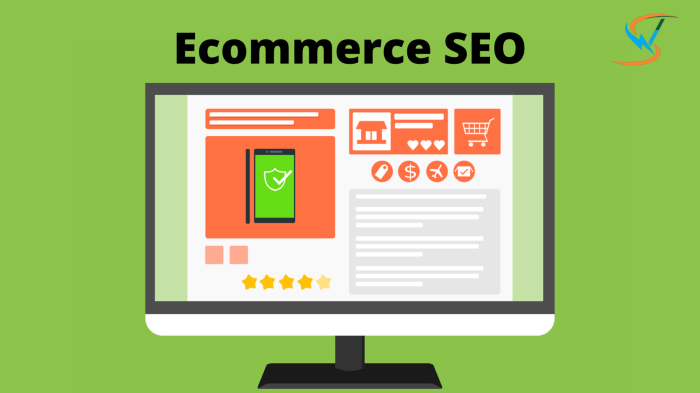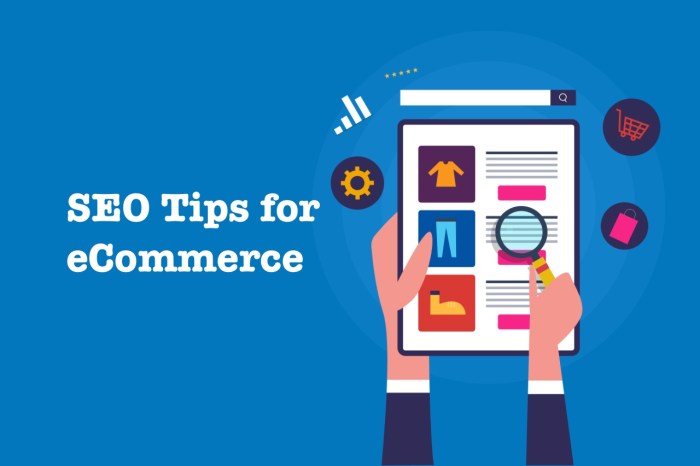E-commerce SEO Tips – E-commerce Tips are the key to unlocking higher online sales and visibility. Dive into the world of for e-commerce with expert strategies that will take your website to the next level.
From understanding the importance of to mastering on-page and off-page tactics, this guide has everything you need to optimize your e-commerce site for success.
Importance of E-commerce

In today’s digital age, having a strong online presence is essential for e-commerce websites. This is where comes into play, as it helps businesses improve their visibility and ranking on search engines, ultimately driving more traffic to their site.
is crucial for e-commerce websites because:
Increased Online Sales
- By implementing proper strategies, e-commerce websites can rank higher on search engine results pages (SERPs), making it easier for potential customers to find them.
- Higher visibility leads to increased organic traffic, which can result in more conversions and online sales.
- Optimizing product pages with relevant s and meta tags can attract qualified leads who are actively searching for products or services offered by the e-commerce site.
Improved Website Visibility, E-commerce SEO Tips
- helps e-commerce websites improve their visibility online, making it easier for users to discover their products or services.
- Optimizing website content and structure can enhance the user experience, leading to higher engagement and lower bounce rates.
- By appearing on the first page of search results, e-commerce websites can build credibility and trust with potential customers.
Ranking on Search Engines
- plays a vital role in determining a website’s ranking on search engines like Google, Bing, and Yahoo.
- By following best practices, e-commerce websites can improve their chances of ranking higher for relevant s and phrases.
- Higher rankings can result in more organic traffic, which can lead to increased brand awareness and customer acquisition.
On-Page Strategies
When it comes to e-commerce websites, on-page plays a crucial role in improving search engine rankings and driving organic traffic. By implementing key on-page techniques, you can enhance the visibility of your products and increase the chances of attracting potential customers.
Optimizing product descriptions, meta tags, and images is essential for e-commerce success. Product descriptions should be unique, informative, and -rich to help search engines understand the content of your pages. Meta tags, including title tags and meta descriptions, should be optimized with relevant s to improve click-through rates and overall visibility. Additionally, optimizing images by using descriptive file names and alt text can help improve the accessibility of your content and enhance the user experience.
Internal linking is another important on-page strategy for e-commerce websites. By strategically linking related products or categories within your site, you can improve the overall structure and navigation, making it easier for both users and search engines to discover and index your content. Internal linking also helps distribute link equity throughout your site, potentially boosting the rankings of your most important pages.
Importance of Optimizing Product Descriptions
- Unique and -rich product descriptions help search engines understand the relevance of your products.
- Well-written descriptions can attract and engage potential customers, leading to higher conversion rates.
- Optimizing product descriptions can improve the overall user experience by providing valuable information to shoppers.
Significance of Meta Tags Optimization
- Optimized meta tags, such as title tags and meta descriptions, can enhance click-through rates in search engine results pages.
- s in meta tags help search engines match your content with user queries, improving visibility and organic traffic.
- Meta tags play a crucial role in on-page , influencing how search engines interpret and display your content.
Benefits of Internal Linking
- Internal linking helps establish a logical hierarchy for your e-commerce website, making it easier for users to navigate and find relevant products.
- By linking related products or categories, you can potentially increase the time users spend on your site, reducing bounce rates.
- Internal links distribute link equity throughout your site, boosting the authority and rankings of important pages.
Off-Page Tactics
When it comes to optimizing e-commerce sites for search engines, off-page tactics play a crucial role in improving visibility and driving organic traffic. These strategies focus on activities outside of your website that can impact your search engine rankings. Let’s dive into some key off-page methods that can benefit e-commerce sites.
Importance of Backlink Building
Building high-quality backlinks is essential for improving your e-commerce site’s search engine rankings. Backlinks from reputable and relevant websites signal to search engines that your site is trustworthy and authoritative. This can help boost your site’s credibility and visibility in search results.
- Focus on acquiring backlinks from authoritative and relevant websites in your industry.
- Guest posting on reputable blogs and websites can help you earn quality backlinks.
- Monitor your backlink profile regularly and disavow any toxic or spammy backlinks to avoid penalties from search engines.
Leveraging Social Media for Off-Page
Social media can be a powerful tool for enhancing your e-commerce site’s off-page efforts. By engaging with your audience and sharing valuable content on social platforms, you can increase brand awareness, drive traffic to your site, and earn valuable backlinks.
- Create and share engaging content on social media platforms to attract your target audience.
- Interact with your followers, respond to comments, and encourage social sharing of your content to increase visibility.
- Collaborate with influencers and industry partners to reach a wider audience and gain quality backlinks.
Mobile Optimization for E-commerce: E-commerce SEO Tips

In today’s digital world, mobile optimization plays a crucial role in the success of e-commerce websites. With the increasing number of users shopping on their mobile devices, it is essential for online retailers to prioritize mobile optimization for better visibility and user experience.
Responsive design is key to improving user experience and rankings on mobile devices. By creating a website that adapts to different screen sizes and devices, users can easily navigate and interact with the site, leading to increased engagement and sales. Search engines also favor mobile-friendly websites, boosting their rankings in search results.
Impact of Mobile Page Speed
When it comes to mobile optimization, page speed is a critical factor that can make or break user engagement and performance. Slow-loading pages not only frustrate users but also result in higher bounce rates and lower search rankings. Optimizing images, minifying code, and leveraging browser caching are some of the strategies to improve mobile page speed and enhance overall user experience.





